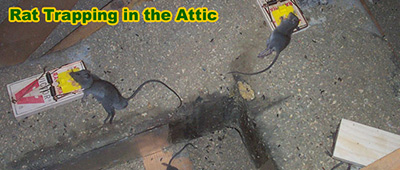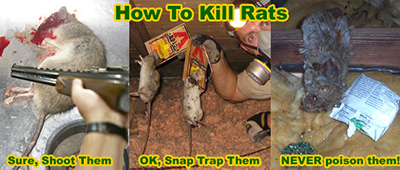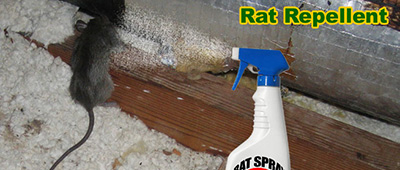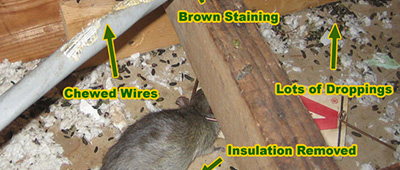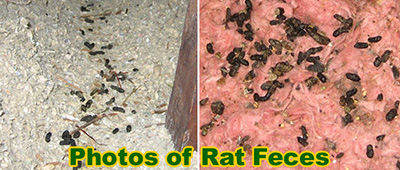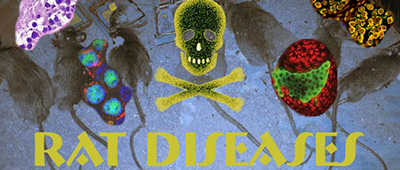Many people are aware that rats spread disease. I am not a
doctor or an expert on zoonotic diseases, so I'm just
repeating some other information that I've found on the web
about rat diseases, as collected from the Centers for
Disease Control and other sources. I list seven of the more
serious diseases below, but it's my understanding that rats
are associated with many more diseases, many not so serious.
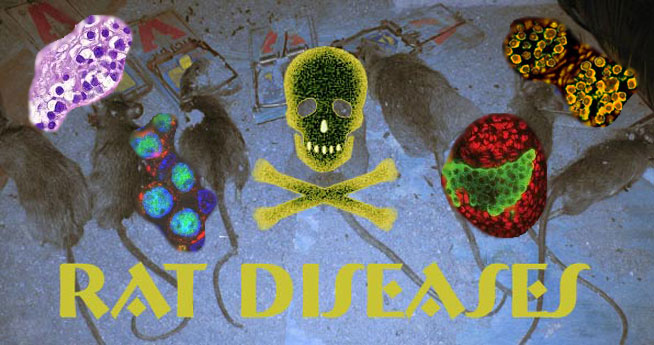
I can personally say that in my experience working as a rat removal specialist, I've never contracted a serious disease from contact with rats or rat feces. I do, however, always wear protection, and you can see me in the photos on this website wearing gloves, a filter mask, and often biohazard suits. I always wash my hands. My anecdotal thought is that health risks from wild rats and other rodents like mice are relatively rare. But just as I wear a seatbelt in the car, I am careful around rats and rat feces.
Eosinophilic Meningitis
Rat-bite fever (RBF)
Leptospirosis
Hantavirus Pulmonary Syndrome (HPS)
Murine Typhus
Salmonella enterica serovar Typhimurium
Bubonic Plague
Help! I've been infected with rat disease!
MANY OF THE SAME DISEASES APPLY TO MICE
Read more about rats:
Do cats keep rats away?
Do rats carry rabies?
Can Rats Chew Through Wires in a Car?
Does car insurance cover rat damage?
Do rats live in more urban areas, or wild areas?
Rats in New York subway
How do you remove a rat stuck in a dumpster?
Why are there so many rats in NYC?

What diseases do rats carry?
There are so many things to worry about when you have a rat invasion in your property, and although damage is one of the more costly side effects of these rodent visitors, the disease threat is often one of the biggest causes of concern. Quite rightly too, as these are animals that can bring with them a whole range of rather nasty diseases, none of which you will want you, or your family members, to come into contact with.Tamed / domesticated mice and rats will generally not carry these diseases, but wild rats are known to spread or carry them, and they can be spread to tamed / domesticated rats and other rodents if the two kinds come into contact with each other. Some of the diseases that they carry can also be passed onto your household pets, particularly when you're talking about problems such as ticks and fleas, and some of the diseases can even be passed onto you and your family members. They can prove to be especially dangerous for the elderly and young children, and also those who are also ill, particularly with a weakened immune system.
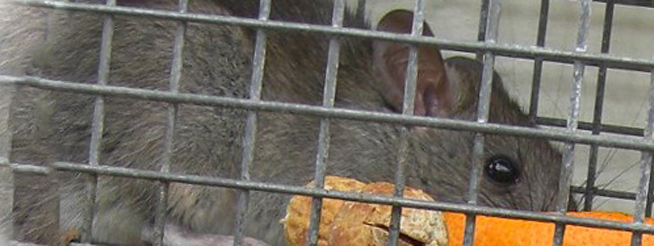
Learn how rats communicate using pheromones.
The disease will affect different people in different ways, and those who are already suffering with a weakened immune system will often be among the worst infected. Often confused with the flu or a common cold, especially in its earlier stages, it can prove fatal to some patients, and totally unnoticeable in others. It's just not worth taking the risk.
Salmonella poisoning is another very nasty bug that rats can bring with them, and both wild rats and domestic rats can actually carry this bacteria. We've probably all suffered with the bug at some point in our lives, and it's easy to see why it wouldn't be pleasant to invite this into your home. Causing a very nasty upset stomach, with vomiting, diarrhea, stomach cramps, a fever, and more, it usually passes after a few days, but some patients can find that they suffer with symptoms for a few weeks. After being infected, symptoms will generally materialize within a few days – 12 – 72 hours. The average time for symptoms to last is less than a week, but dehydration can often cause complications, and may require a spell in hospital. In the worst of cases, without the right treatment, it can prove fatal.
Rats can pass on salmonella poisoning through their feces and urine, much like Leptospirosis, and that's why a thorough cleanup operation is vital after you have had a rat invasion.
Rat-bite fever is another disease often passed on through rats, but, just as the name suggests, this one tends to be passed on through a bite from a rat. It can, however, be passed on through scratches, and also through the urine and feces of an infected rat. Most people aren't unlucky enough to get that close. People would much rather run away from rats generally, and the same works in the other direction – rats would much rather scamper away than stay and fight.
Rat-bite fever can come in two forms – spirillary and streptobacillary. The latter will bring symptoms similar to nausea and vomiting, a fever, muscle pain and a rash, while the spirillary infection often brings the same rash, but with a fever that recurs, and swollen lymph nodes also.
As you can see, it's often the feces and urine of the rats that pose the biggest problems in the realms of disease threats. That's why rat removal is actually the smallest part of the job – it's the cleanup and repair work that often causes the biggest loss to time, and money also. You'll be happy to know that those are just two parts of the full service that we offer so you don't need to worry about it.
Go back to the Rats in the Attic home page.
Rat diseases symptoms in humans
The symptoms that you will be faced with if a rat has infected you with something will very much depend on what the rat has infected you with. Just because you have come in contact with a rat doesn't mean that you will be suffering from a disease that the rat could be carrying, but you can't rule that out. That's what makes working and living alongside rats so dangerous - you just never know. You never can tell.
In the majority of cases - up to ninety percent (it is believe) - leptospirosis just results in a few cold and flu-like symptoms, and the victim is not any the wiser that they have suffered with leptospirosis at all. Rats often spread diseases such as leptospirosis via their urine. They spray the urine and this contaminates food and water sources, as well as things such as bedding, floors, walls, attic insulation, curtains, plates, glasses, dog and cat bowls, and a lot more. If a rat were to run across your plate on the floor, for example, the bacteria that causes the leptospirosis condition could be left there. When you then put a sandwich on that plate, and then transfer the sandwich to your mouth, you could potentially ingest the bacteria.
Rats are also dangerous in the sense that they can bring other insects and critters into the home, which can also pass on diseases not only to you, but to your household pets too. We're sure you don't want you or your human family members to become ill, and for most households, the pets come into the same category - part of the family. Infected ticks, for example, could easily transmit something like Lyme Disease or Colorado Tick Fever, also known as CTF. The spring and summer months are the worst for this - these are the months that ticks are most prominent. Again, just like many of the other rat diseases symptoms in humans, chills, fever, headaches, and more accompany the onset of the disease. These usually hit around a week after the initial infection - a bite from an infected tick - but it can start as little as one day afterwards, and can take as long as 14 days.
Find out more: What's the Difference Between Rat and Mouse Feces?
Western parts of the United States, as well as Canada, are prone to infected Mountain wood ticks, which are the worst culprits, but ticks are a concern all over the world. They are just another reason why having rats in your building is a very bad thing, whether it's a commercial or a residential property. Hantavirus is another disease that can be transmitted from rats to humans, and this again has symptoms very much like the flu. If the symptoms are ignored / mistaken for colds or flu, however, things can get take a much more dangerous turn, resulting in breathing difficulties and, if left untreated further, death.
In short, there are a lot of diseases that come with rats, and many of them have symptoms that you wouldn't necessarily pay much attention to at the beginning. Can you really be so sure that what you are suffering from is the flu? Or could you have rats in your home that you haven't spotted yet?
Go back to the Rats in the Attic home page.
Hire a Professional Rat Removal Company
Rat control work is definitely not easy! I've written full rat control instructions on this website, but doing the job correctly is very difficult. Experience matters a whole lot! I did many rat jobs, dozens of jobs over my first couple of years, and even
though I'm very observant and careful and hard-working, I messed up again and again, and my customers continued to have rat problems, and I had to re-do my jobs over and over. It wasn't until I had a LOT of experience under my belt
that I got good at solving rat problems in attics and buildings PERMANENTLY. I honestly recommend that you hire a seasoned professional to do your rat control work. This website lists rodent removal experts in 638 different US cities and towns.
I have friends that I have personally trained in these cities:
If you don't see your city/town listed above, click the below image of the USA to go to my wildlife removal directory, which lists over 700 cities and towns in the United States:

And for goodness' sake DO NOT hire a regular exterminator company or your usual pest control company. They will just throw some poison in the attic, and try to sign you up for a never-ending monthly or quarterly contract. They WANT to NEVER solve the problem, so they can keep charging you. The cost of rat removal ends up being higher with a pest control company. You want a wildlife control professional who will stop the source of the problem, and seal off all entry points, permanently. Up front cost is higher, but you only pay once. I have compiled a list of good experts. Click your state on this map in order to hire a professional in your area.
Rat diseases that affect humans
Sadly, there are more than a few diseases that rats can transmit to humans. We're sure they don't mean to be rather dangerous, but they are, and that's the reality you will need to face if you have rats in your home.
Leptospirosis is another deadly disease that can be passed on from rats to humans, and this one is usually passed from one animal to another, or to a person, via contaminated rat urine. Once again, rat urine can be almost anywhere. Rats expel urine as they run, and they really do run everywhere around your home. There could be spots of urine everywhere from bedding to kitchen countertops, floors, and more.
For the record, leptospirosis can cause seriously deadly complications for humans, particularly those who have a weakened immune system in the first place. Kidney and liver damage are just two negative side effects of this condition, which can also be passed on via the airborne spores of the leptospirosis virus, which means that dried feces can be a problem. You shouldn't sweep rat feces for fear of sending these spores into the air where they can then be inhaled by humans and other animals - your household pets, for example.
Lymphocytic choriomeningitis doesn't sound pleasant, and it isn't, but it is another of the diseases that rats can pass on to humans. It is a disease that affects the neurological system, with symptoms usually arising around a week after the initial infection has taken place. Pregnant women can face problems with pregnancy, including miscarriage and stillbirth, and the disease itself is spread from rat to person by way of contaminated nesting materials, poop, urine, and even saliva. This means that a rat could pass this disease on just by drinking the same water as you. The transmission could also take place in a number of other ways - via the mouth, eyes, nose, and other cavities.
Salmonellosis, otherwise known as salmonella to you and I, is another disease that you'll probably already have encountered in your home at least once. If you've ever had a strange and unusual incident of food poisoning, one that you can't explain, it might be time to start looking around and seeing if you can spot any rat holes, rat droppings, or patches of grease stains on the walls that could have been left by a rat rubbing up against it. Rats can be very dangerous to humans, and to other animals too, including your poor household pets. If you have a rat infestation, you will need to get rid of it immediately. If you need a hand doing that, get in touch for some free advice or a free quote today.
Go back to the Rats in the Attic home page.
If you know next to nothing about rats, you probably still know that they are animals you should stay away from if you care about your health. That is because, throughout history, rats and other rodents have always been a major factor in the spreading of diseases.
Notably, a rat disease once killed two-thirds of all human life in Europe several hundreds of years ago. You probably learned about this in school with names like the Black Death and the plague. This is only one of the potential diseases to be caught from rats.
Here are diseases directly transmitted by rats and how you can catch them.
- Hantavirus
- Breathing in dried urine or feces
- Direct contact with urine or feces
- Bite wounds
- Hemorrhagic Fever
- Breathing in dried urine or feces
- Direct contact with urine or feces
- Bite wounds
- Uncommonly, person-to-person contact
- Lassa Fever
- Breathing in dried urine or feces
- Direct contact with urine or feces
- Bite wounds
- Eating food contaminated with urine or droppings
- Person-to-person contact
- Leptospirosis
- Eating food or drinking liquids contaminated with urine
- Contact through mucus membranes with infected urine
- Lymphocytic Chorio-Meningitis
- Breathing in dried urine or feces
- Direct contact with urine or feces
- Bite wounds
- Plague
- Bite from an infected flea
- Direct contact with an infected animal
- Rat-Bite Fever
- Bite or scratch wound from an infected animal or direct contact with a dead rat
- Eating or drinking anything contaminated by rat feces
- Salmonellosis
- Eating or drinking food or water contaminated with feces
- Arenaviruses
- Breathing in dried urine or feces
- Direct contact with urine or feces
- Bite wounds
- May spread from person-to-person contact
- Tularemia
- Handling of infected animal corpses
- Bites from an infected tick, fly, or another insect
- Eating or drinking contaminated food and water
- Breathing in the bacteria on a droplet from a cough or sneeze
As you can see, there are several diseases that can be caused by rats. While the symptoms of these viruses and other illnesses can be mild and easily dealt with, they can also be incredibly deadly if they are not taken care of quickly.
One of the most common ways for someone to become infected is while they are attempting to clean up after a rat infestation without taking the proper levels of precaution necessary to do so safely. After rats have infested your home there will be an incredible amount of dried urine and feces in whatever spaces they were occupying.
To protect yourself, any time you enter an area where rats had previously been living you will need to wear some type of filter mask or respirator system. You should probably also wear eye coverings to avoid contact with the mucosal membranes in your eyes.


